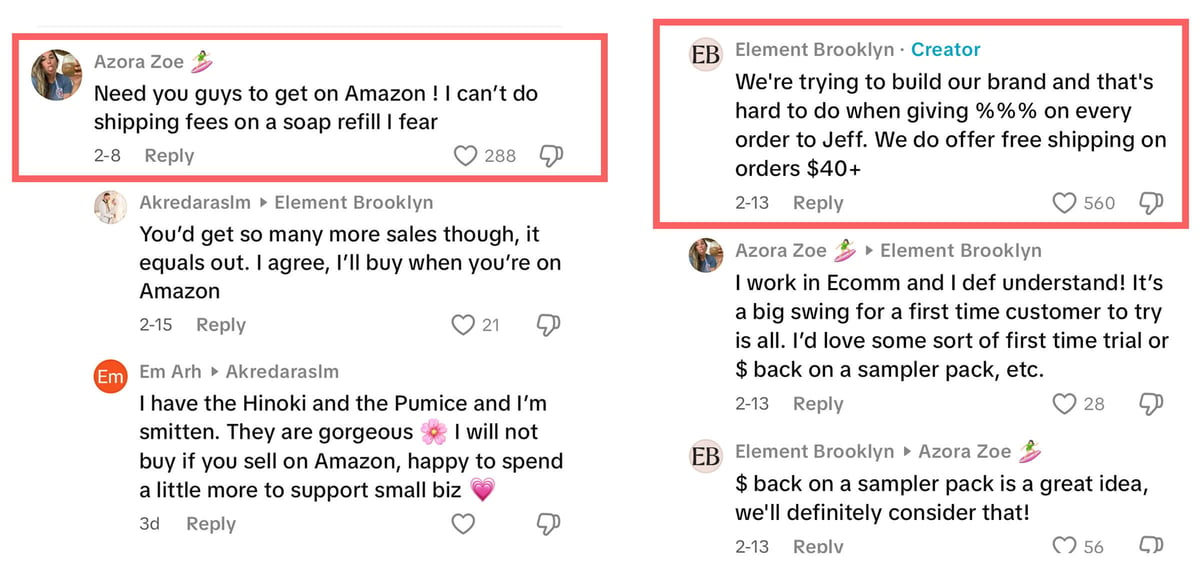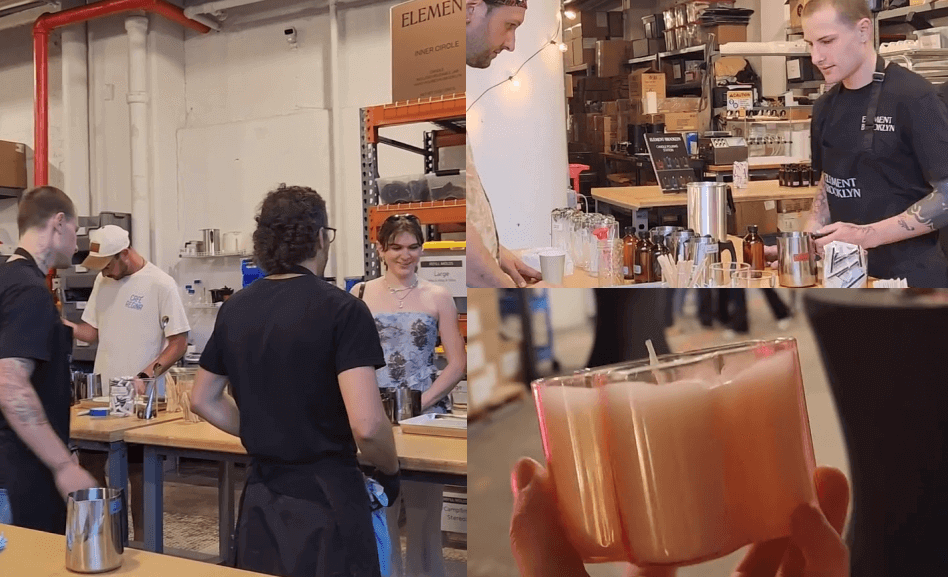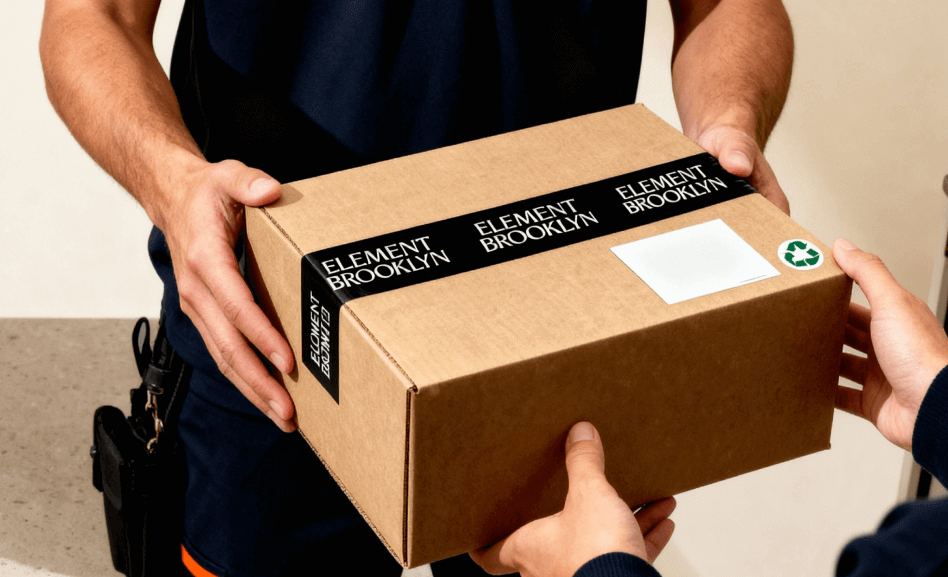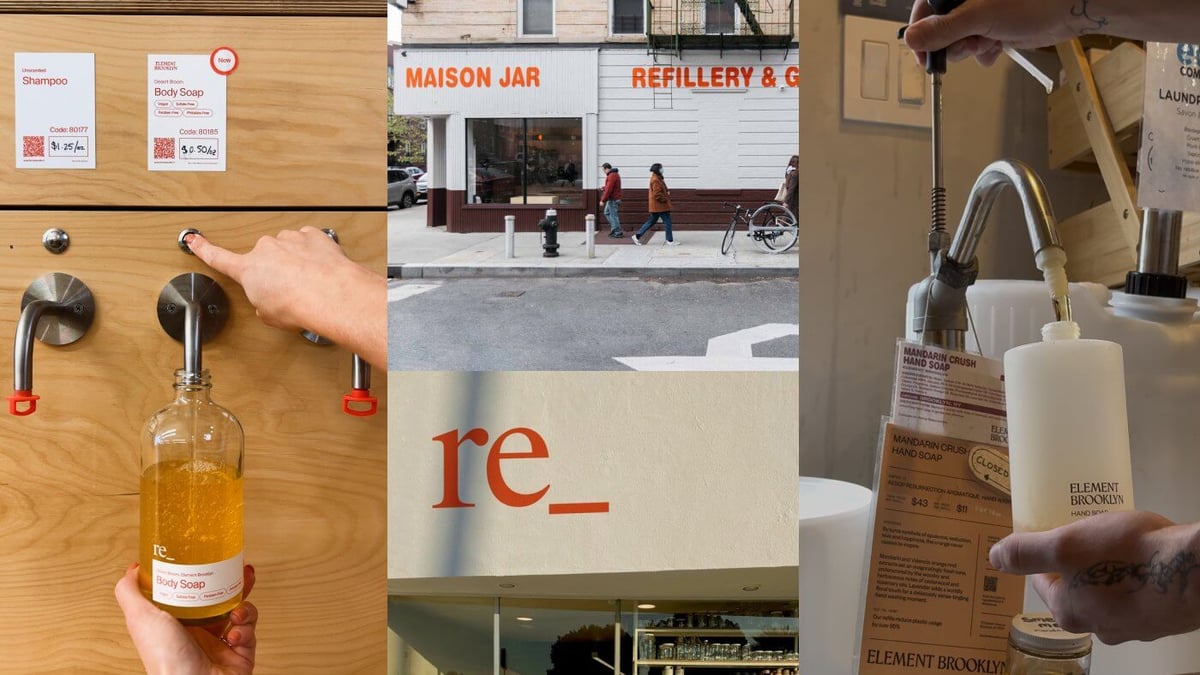We get asked all the time why our products aren’t available on Amazon. A recent TikTok comment with hundreds of likes summed it up: “Need you guys to get on Amazon! I can’t do shipping fees on a soap refill.” And we get it. Amazon has become the default store for nearly everything, and for many products its convenience is undeniable. But there are also real reasons for a brand to avoid selling on Amazon. In the same way we unpacked the myths around “free shipping” in another blog post, we want to share openly why Element Brooklyn has chosen to go its own way.

Keeping a direct relationship with our customers
One of the biggest reasons we avoid Amazon is to keep a direct relationship with our customers. Amazon tightly controls how brands can communicate, so if you order there, we cannot reach out to you again. Our email newsletters announcing new fragrance launches have been one of the main drivers of our growth, and that would not be possible if the customer relationship belonged to Amazon instead of us. We would also lose the ability to build community in more personal ways, like the candle vessel repurposing event we hosted at our Brooklyn HQ earlier this year.

Preserving our brand experience
Customer service is better when you deal directly with a brand. We have greater control over presentation and packaging when we’re shipping your order. And if you have a problem and reach out to us, the same people who make and pack your products will be the ones helping you. This means we can offer accurate and detailed answers and highly personalized solutions.
On Amazon, our products would be listed on plain product pages that look like everyone else’s, limiting our ability to help customers make the right decisions. Our recently released scent quiz, for example, has helped thousands of customers find the right fragrance. It’s important for us to be able to give you all the context and content you need to appreciate what you’re buying – something we can do much better on our own platform.

High fees and a race to the bottom
Selling on Amazon comes with a lot of costs that are ultimately borne by either the brand or the customer. For starters, Amazon takes a hefty cut of every sale, around 15% in most cases. Most brands also opt in to Amazon’s fulfillment service (FBA) to get Prime shipping, which involves additional fees. Total fees are often as much as 50% of each sale.
As we sell our products for as little as one tenth the price of some of our competitors, our margins aren’t that large to begin with, and we’d therefore want to charge more on Amazon. But although Amazon no longer has a “price parity” rule, it still down-ranks listings that are cheaper elsewhere, which means that to be competitive on Amazon we’d need to raise prices both on Amazon and on our own site.
Amazon is notorious for fierce price competition. By staying off Amazon, we avoid getting sucked into that downward spiral. We set our prices based on our costs, the quality of our ingredients, and the value we believe is fair – not by trying to game a system so that we can appear at the top of search results. This stability means we can maintain quality and continue to invest in better products. Element Brooklyn is not a discount brand, and while we very occasionally have sales, we’re not interested in training our customers to only buy when there’s a 30% off coupon. That’s another facet of “thoughtful consumption”: buy something when you need or truly want it, not just because an algorithm dangled a limited-time deal.

Excessive packaging and environmental impact
If you’ve read our Who Pays for Free Shipping? post, you know we care about the environmental impact of order fulfillment. When we fulfill orders in-house, we charge use recycled and minimal packaging and compostable void fillers like Hexafil. Selling on Amazon would conflict with a lot of our sustainability efforts around packaging waste. Amazon’s logistics are optimized for speed and convenience, and they often require merchants to supply their products with unnecessary extra packaging (like poly bags) to meet their handling requirements.
Amazon also tends to ship items separately as they’re ready, meaning if you order three things, you might get three separate packages (often with a lot of air pillows or plastic padding filling the space). Although the company has made some noise about recycling, one study found that only 4 out of 93 of Amazon packages sent to supposed “plastic film recycling” drop-offs actually got recycled, with most ending up in landfills or incinerators.

Ethical and values considerations
Beyond the practical business reasons, there’s a bigger philosophical reason we avoid Amazon: our values just don’t align. Element Brooklyn is about thoughtful consumption, community, and sustainability. Amazon, for all its conveniences, embodies a very different ethos: growth at all costs, consumption on demand, and often, squeezing stakeholders to maximize efficiency.
One concern is Amazon’s market power and practices. The company has been widely criticized (and investigated by regulators) for using its monopolistic scale to undercut competition. Because Amazon has such deep pockets and control, it can afford to sell products at a loss or copy popular products and favor its own versions. This can hurt innovation and small businesses in the long run. We prefer a diverse marketplace of many independent brands, rather than one where a huge player dictates the terms.
We also have ethical objections to certain Amazon practices that clash with our mission. For example, Amazon has faced scrutiny for its treatment of workers – from grueling warehouse conditions to discouraging labor organizing. As a small company, we prioritize fair and safe working conditions for our team, and it doesn’t sit right with us to profit off a system that might be underpaying or overworking people behind the scenes.
Another aspect is Amazon’s approach to consumption. The ease of one-click ordering and endless suggestions on Amazon can encourage people to buy more stuff, more frequently. That’s great for Amazon’s bottom line, but not so great for the planet or for fostering mindful buying habits. Thoughtful consumption means considering what you buy, who you buy it from, and how it fits your values.

We’re in this for the long haul
We hope that by sharing these reasons, you’ll see why we think buying directly from small brands is worth the slight extra effort. When you purchase from Element Brooklyn (or any independent brand’s own site), you’re voting with your wallet for a different kind of commerce that values quality, transparency, and sustainability over ultra-convenience.
Avoiding Amazon is a deliberate decision because the costs – to our brand experience, to our customer relationships, and to our values – outweigh the benefits for us. We’re in this for the long haul, building something we’re proud of and that you, our community, can trust. And we believe that approach creates far more lasting value than chasing every possible shortcut to growth.




